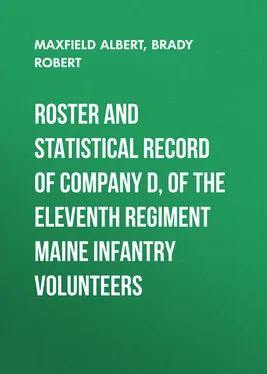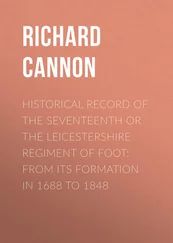Albert Maxfield - Roster and Statistical Record of Company D, of the Eleventh Regiment Maine Infantry Volunteers
Здесь есть возможность читать онлайн «Albert Maxfield - Roster and Statistical Record of Company D, of the Eleventh Regiment Maine Infantry Volunteers» — ознакомительный отрывок электронной книги совершенно бесплатно, а после прочтения отрывка купить полную версию. В некоторых случаях можно слушать аудио, скачать через торрент в формате fb2 и присутствует краткое содержание. Жанр: foreign_antique, foreign_prose, на английском языке. Описание произведения, (предисловие) а так же отзывы посетителей доступны на портале библиотеки ЛибКат.
- Название:Roster and Statistical Record of Company D, of the Eleventh Regiment Maine Infantry Volunteers
- Автор:
- Жанр:
- Год:неизвестен
- ISBN:нет данных
- Рейтинг книги:5 / 5. Голосов: 1
-
Избранное:Добавить в избранное
- Отзывы:
-
Ваша оценка:
- 100
- 1
- 2
- 3
- 4
- 5
Roster and Statistical Record of Company D, of the Eleventh Regiment Maine Infantry Volunteers: краткое содержание, описание и аннотация
Предлагаем к чтению аннотацию, описание, краткое содержание или предисловие (зависит от того, что написал сам автор книги «Roster and Statistical Record of Company D, of the Eleventh Regiment Maine Infantry Volunteers»). Если вы не нашли необходимую информацию о книге — напишите в комментариях, мы постараемся отыскать её.
Roster and Statistical Record of Company D, of the Eleventh Regiment Maine Infantry Volunteers — читать онлайн ознакомительный отрывок
Ниже представлен текст книги, разбитый по страницам. Система сохранения места последней прочитанной страницы, позволяет с удобством читать онлайн бесплатно книгу «Roster and Statistical Record of Company D, of the Eleventh Regiment Maine Infantry Volunteers», без необходимости каждый раз заново искать на чём Вы остановились. Поставьте закладку, и сможете в любой момент перейти на страницу, на которой закончили чтение.
Интервал:
Закладка:
As the different commands of our army moved forward, they converged on the road leading from Yorktown to Williamsburg with the result that this road was soon packed with horse, foot and artillery, all pushing eagerly forward, and without overmuch regards for right of way.
Company D, holding the right of the regiment, was a pleased auditor to a little conversation between Colonel Caldwell and the irate commander of a regiment the Eleventh had unceremoniously displaced. The displaced commander was evidently, by manner and seat in the saddle, a regular officer, which then meant among other things, an officer with large ideas of his own importance as a trained military man, and small ones of all volunteer officers.
"Sir," roared he, riding up to Colonel Caldwell, "How dare you march across the head of my command?"
The Colonel looked at him in his large placid way, without answering him, much as a mastiff looks at a snarling terrier.
"Do you know who I am, sir?" yelled the angry commander, now doubly enraged at the elaborate indifference, and the apparently studied silence of our Colonel. "I am Major so-and-so of such and such a regiment."
"And I," answered Colonel Caldwell, smiling blandly, touching his cap with military courtesy as he spoke, "And I am Colonel John C. Caldwell, commanding the Eleventh Maine Regiment of Infantry Volunteers, and am quite at your service, sir."
Speechless with rage, and fairly gasping at the haw-haw of approval we country bumpkins gave the Colonel's answer, Major so-and-so backed his horse a little, turned him, and galloped away in as furious a state of mind as any gallant Major ever galloped in.
This bright May day was spent by the infantry in marching and halting while the cavalry pressed forward on the heels of the flying enemy. Towards night the regiments went into bivouac. Then the men scattered for foraging purposes. The inhabitants had mainly fled to Richmond, perhaps naturally, they consisting of women, children and male antiquities generally, McClellan's report stating that every able bodied male of the Peninsula was in the ranks of the rebel army.
They went hastily, evidently. I remember one house from which the occupants had fled just as they were about to seat themselves to a meal apparently, for the table was spread with dishes and untouched victuals. Loading themselves with food and furniture from these deserted houses, the boys returned to camp.
My particular group of D slept that night on a feather bed, spread on the ground, with sheets, quilts, pillows – all the accompaniments. But, alas, it began to rain heavily in the night, so that before morning our downy nest of the evening before was about as comfortable a sleeping place as a bed-tick filled with mush and milk would be – a soaked, oozing, nasty mess.
In the morning we pushed forward in a heavy rain over roads cut up by artillery wheels and punched full of holes by the hoofs of innumerable horses. We could soon hear the battle of Williamsburg progressing in front as we, wet to the skin, plodded on our miserable way. Towards night, General McClellan ordered General Naglee to push forward and reinforce General Hancock, who was reported as heavily pressed. We moved forward rapidly and zealously, but before we could reach Hancock, that brilliant commander had, by feigning a retreat, led the opposing enemy from their intrenchments into the open field, where with a few heavy volleys he stopped them, then charging with the bayonet, routed and dispersed their column, capturing some five hundred of it.
We arrived only in time to witness the overthrow of the enemy, and to give the victors generous cheers of congratulations. Taking position in line, we stood to our arms through a cold, wet night, entirely without fire, and almost without food, our nearly empty haversacks furnishing us with a very scanty supper. It was a night to remember.
But in the morning, the dreaded morning, when all that long line of earthworks, beyond which lay the old city of Williamsburg, must be carried; in the morning our chilled blood was not only warmed by a brilliant sun, but by the knowledge that the Confederates had evacuated these intrenchments too, and were still falling back towards Richmond.
The supply trains had been left behind in leaving the lines before Yorktown, and when enterprising wagon-masters did get their trains towards the front, they were compelled to give way to hurrying troops and artillery. It now became necessary to await the coming of these but lately despised supply trains, for soldiers, to march and fight, must be fed, and you might as well try to get fight out of empty cartridge boxes as out of empty haversacks.
A few days then, we of necessity spent before Williamsburg, to rest the exhausted troops and to replenish empty cartridge boxes and haversacks. These few days were mainly passed by our men in taking a first sight of the horrors of war. Not only our own wounded were there, but the enemy's as well, left behind in the care of their surgeons, in the hurried flight of the rear guard that had made the stand for delay at Williamsburg. Cut, hacked, shot, dead and dying, a sorry sight there was in the barracks Confederate troops had occupied during the winter, now used for hospital purposes. And out on the field was a worse one. Dead bodies lay where they fell, and as they fell. Some in the act of loading, some as if firing, these that had been shot dead in their tracks; others lay on their backs or curled into tortuous shapes, staring stonily, as if for a last look at the world that had faded from their darkening eyes as the life blood poured from their mortal wounds. However hardened we became afterwards, the most indifferent of us by nature was then visibly affected by the gruesome sights we saw on the bloody field of Williamsburg.
The 9th of May we were on the march again, but moved slowly, the roads being few and narrow, and the weather rainy. On the 13th, Colonel Caldwell having been promoted a Brigadier-General, took leave of us and Colonel Plaisted assumed command. It was two o'clock in the morning of the 14th of May before we reached New Kent Court House, and about the 19th before we reached the Chickahominy and took possession of the ruins of Bottoms and the Railroad Bridges.
A reconnoissance D and a piece of artillery made showed that the last named bridge had been burned. We had a merry exchange of grape with the enemy's artillery across the river, here about forty feet wide, fringed with a dense growth of forest trees, and bordered by low marshy bottom lands, varying from half a mile to a mile in width, as McClellan describes it. The following day, the 20th, Naglee's Brigade crossed Bottoms Bridge and D with another company of infantry and a squadron of cavalry followed General Naglee for some miles along a road leading through White Oak Swamp to the James River. We touched the enemy's cavalry but once and quickly formed at a bridge to receive his anticipated charge. It not coming, General Naglee crossed the bridge with his cavalry and charged the enemy, the General at the head of his little force scattering the enemy in every direction but ours. We then marched on again for some miles, when the infantry went into position at a big farm house on a commanding hill and General Naglee and the cavalry rode away towards the James River. It was said that they watered their horses in that river before returning to us, which they did in about an hour. We then made a rapid retrograde movement for Bottoms Bridge, marching back by another road than that we had taken in advancing, by this sharp manoeuvre escaping the attention of a body of gray coated gentlemen who had assembled at a point on our line of advance to give us a taste of Southern hospitality on our return march. This rapid and brilliant reconnoissance, right through the enemy's country, gave General McClellan important information regarding roads and their connections that he found very useful to him when unexpected circumstances forced us to retreat in that direction.
Читать дальшеИнтервал:
Закладка:
Похожие книги на «Roster and Statistical Record of Company D, of the Eleventh Regiment Maine Infantry Volunteers»
Представляем Вашему вниманию похожие книги на «Roster and Statistical Record of Company D, of the Eleventh Regiment Maine Infantry Volunteers» списком для выбора. Мы отобрали схожую по названию и смыслу литературу в надежде предоставить читателям больше вариантов отыскать новые, интересные, ещё непрочитанные произведения.
Обсуждение, отзывы о книге «Roster and Statistical Record of Company D, of the Eleventh Regiment Maine Infantry Volunteers» и просто собственные мнения читателей. Оставьте ваши комментарии, напишите, что Вы думаете о произведении, его смысле или главных героях. Укажите что конкретно понравилось, а что нет, и почему Вы так считаете.












